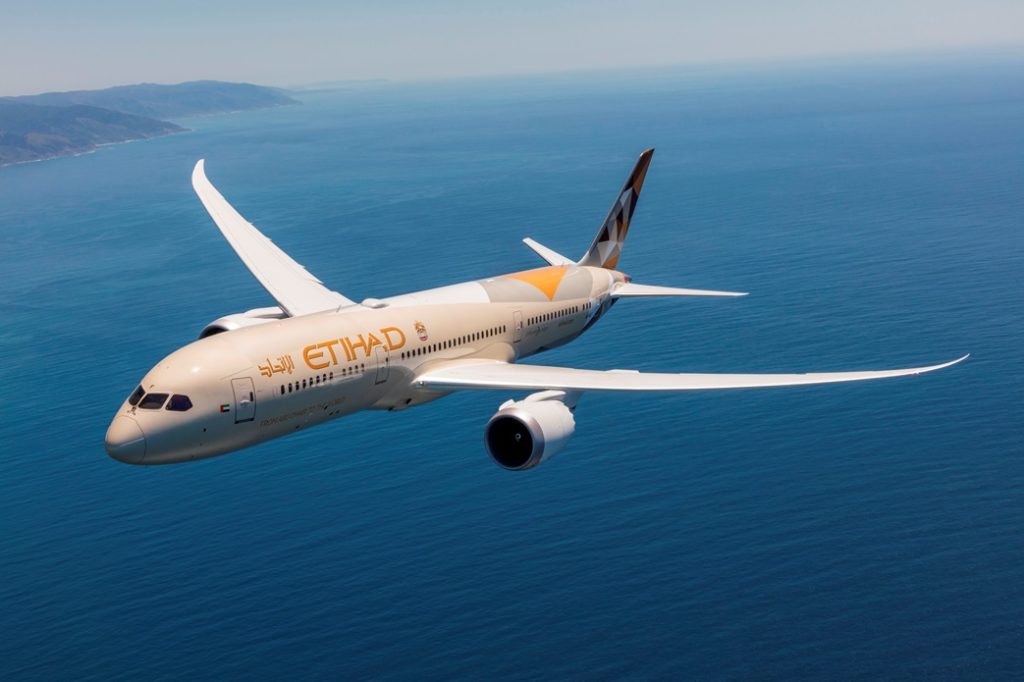 Etihad Airways Boeing 787-9 Dreamliner
Etihad Airways Boeing 787-9 DreamlinerIt is now “business as usual” in the skies, according to the officials, as United States and United Arab Emirates airlines have confirmed that there is no freeze of the 'fifth freedom' routes to the US that do not originate in Dubai,.
US and UAE agreed to preserve their security partnership even if their dispute over alleged unfair practices of Gulf carriers – Emirates, Etihad Airways and Qatar Airways – remains unresolved.
The agreement on civil aviation was announced on 14 May following a meeting between US secretary Mike Pompeo and the UAE’s minister of state for foreign affairs and international cooperation, Sheikh Abdullah bin Zayed Al Nahyan.
The UAE officials also confirmed that the fifth freedom has been restored. 'Fifth freedom' refers to the right for an airline to fly between two foreign countries during flights while the flight originates or ends in one's own country.
UAE officials clarified the statements made by several news outlets that reported there is an alleged “freeze” on opening fifth freedom rights stemming from the organisation Americans for Fair Skies’ response to the agreement claiming that the UAE has agreed to halt fifth freedom routes into the US.
On the night of 11 May, Americans for Fair Skies and the Fair and Open Skies Group issued statements praising President Donald J. Trump for protecting US airlines from alleged unfair competitive practices by Gulf airlines.
"The UAE has agreed to end its market-distorting airline subsidies"
In a statement, Americans for Fair Skies said: “As a result of President Trump’s leadership on trade enforcement to safeguard U.S. jobs, the United Arab Emirates (UAE) has agreed to end its market-distorting airline subsidies and freeze any additional new Fifth Freedom routes into the United States. This is a huge step forward in the fight for fair competition in the international aviation marketplace.”
“President Trump’s leadership and deal-making savvy have now led to successful negotiations for U.S. workers with both the UAE and the State of Qatar, which was announced this past January.”
US airlines also applauded president Trump saying that he stands up to countries that violate trade agreements and it is a “win” for Americans.
UAE officials, on the other hand, was also happy with the agreement but confirmed that there is no freeze on fifth freedom flights.
“Aviation is at the centre of a UAE-US trade and commercial relationship that generates enormous benefits from both countries. Today’s announcement confirms business as usual by validating all the rights and benefits – including ‘fifth freedom’ services – of the 2002 air transport agreement between the two countries,” Sheikh Abdullah said in a statement after the meeting.
"Complete commercial flexibility"
Sheikh Abdullah added that UAE and US airlines will “continue to have complete commercial flexibility to add or adjust service to meet traveller needs.”
Middle East airlines are also happy with the deal. Emirates Airlines responded that they welcomed the agreement adding that it did not agree to cut the existing traffic rights and remained its right to expand services to the US and Europe.
Dispute remains unresolved
The ongoing dispute was sparked by allegations that the rapid growth of the three Gulf carriers is due to more than $50 billion in government subsidies that enabled them to take market share from U.S. carriers and European partners such as Deutsche Lufthansa AG.
The three Middle East carriers denied the allegations.
The new agreement entails Emirates Airline and Etihad Airways to improve financial disclosures and avoid cross-subsidization by government-owned service suppliers. The lack of transparency is also one of the roots of the ongoing dispute between the US carriers and labor unions and the Gulf carriers.
However, the agreement fell short of the demands of US airlines and labor unions to curb the expansion of the three state-owned carriers. The group reportedly have spent an estimated $50 million on lobbying over the past three years for US lawmakers to enact this.




















